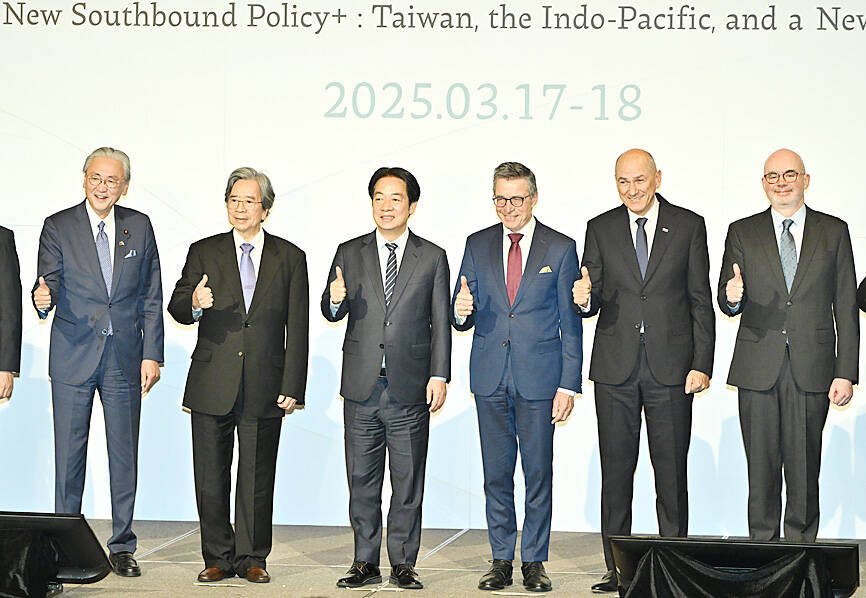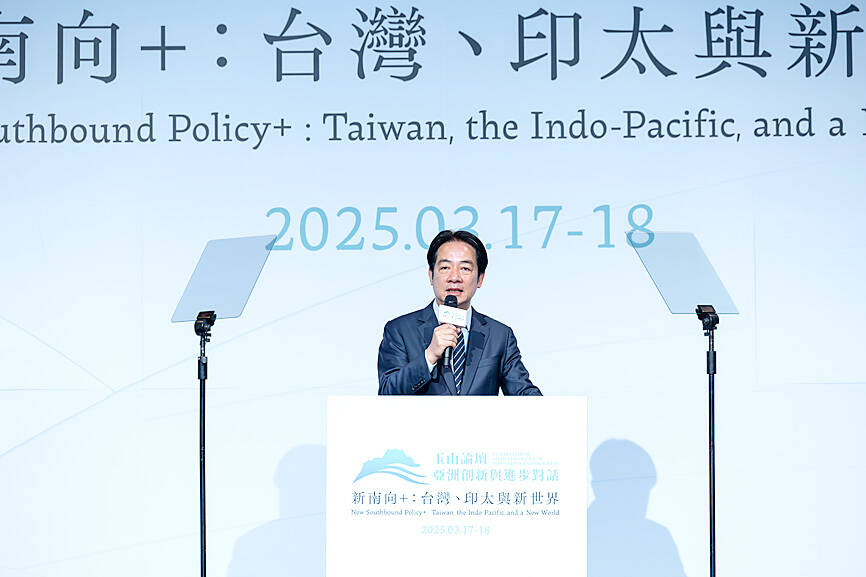Taiwan will work with democratic partners to boost “non-red” supply chains and digital solidarity, as well as respond to threats and challenges posed by expanding authoritarianism, President William Lai (賴清德) said at the opening of the Yushan Forum in Taipei yesterday.
The theme of this year’s two-day annual forum, cohosted by the Taiwan-Asia Exchange Foundation and the Ministry of Foreign Affairs, is “New Southbound Policy+: Taiwan, the Indo-Pacific, and a New World.”
The Yushan Forum has become more than a platform for the New Southbound Policy, with more than 3,600 international participants in the past eight years, deepening Taiwan’s connections with the world, Lai said.

Photo: Tien Yu-hua, Taipei Times
“Today’s Taiwan celebrates not only the democratic achievements that are recognized by the international community, but also our strengths in the semiconductor and other tech industries, which enable us to play a key role in restructuring global democratic supply chains and the economic order,” the president said.
Building on its foundation as a “silicon island,” Taiwan is accelerating its innovation and artificial intelligence applications, as well as developing other promising fields, including quantum technology and precision medicine, he said.
“In the past, Taiwanese industries went from moving ‘westward’ across the Taiwan Strait, to shifting ‘southbound,’ to working closer with the ‘north,’ but now we are confidently stepping across the Pacific, reaching ‘eastward’ to the Americas and other regions,” he said.

Photo: screen grab from the Presidential Office’s Flickr page
“While staying firmly rooted in Taiwan, our enterprises are expanding their global presence and marketing worldwide,” he said.
“Taiwan will continue to engage with the world, and we welcome the world to come closer to Taiwan,” he said. “Through international cooperation, we hope to build an even more inclusive, resilient, prosperous Indo-Pacific, while jointly defending the democracy, freedom and peace we so firmly believe in.”
Lai thanked all the participants for supporting Taiwan, and pledged that Taiwan would “strive alongside its democratic partners to boost ‘non-red’ supply chains and digital solidarity, and together respond to the threats and challenges posed by expanding authoritarianism.”
Japan-Taiwan Parliamentary Friendship Association chairman Keiji Furuya said it was his fifth straight year to attend the forum.
Over the past few years, Taiwan’s GDP has surged to more than NT$32 trillion (US$907 billion), investment in China has dropped from 44 percent to 11 percent of the total, and global trust and recognition of Taiwanese have grown, he said.
Despite the lack of official diplomatic ties, the association has played an important role in connecting Taiwan and Japan in the past 50 years, including allowing Taiwanese to be listed on Japanese family registrations from this year to protect their rights and dignity, he said.
Japan has continued to expand its cooperation with Taiwan in different areas, people-to-people exchanges reached an all-time high last year and the association is working on policies to strengthen bilateral ties for future generations, he said.
Citing former Japanese prime minister Shinzo Abe’s remarks that “a Taiwan contingency is Japan’s contingency as well,” Furuya said peace and stability in the Taiwan Strait has a major impact on global security and supply chains.
China increased its defense spending by 7.2 percent last year, demonstrating its determination to further expand its military power, Furuya said.
“When you look at the actions of Chinese President Xi Jinping’s [習近平] dictatorship, attempting to unilaterally change the ‘status quo,’ we can imagine the risks that lie ahead,” Furuya said. “China’s approach has been consistent; under the guise of international contribution, it concerns only its own benefits.”
As the situation around Taiwan gets more serious each year, it is extremely important for countries with shared common values — democracy, freedom, rule of law and fundamental human rights — to steadily strengthen cooperation, he added.
Meanwhile, reiterating the US’ commitment to stand strong with its allies in the Indo-Pacific region, American Institute in Taiwan Director Raymond Greene told the forum that US President Donald Trump has made clear his deep commitment to securing global peace, and in the Indo-Pacific, it means strengthening deterrence to prevent a war from breaking out.
Peace and stability across the Taiwan Strait are “an indispensable element of security and prosperity for the international community,” he said.
“Every country in the world has stakes in preserving peace in the Taiwan Strait,” Greene said, adding that a conservative estimate is that a Taiwan conflict would cost 10 percent of global GDP, higher than World War II.
The US will continue to assist Taiwan to expand its self-defense capabilities and societal resilience in the face of China’s destabilizing military, economic and diplomatic pressure campaign, he said.
It is crucial that Taiwan rapidly acquire the asymmetric capabilities most needed to deter aggression, he said.
Lai’s initiative to crack down on long-standing Chinese espionage and influence operations should further enhance the US’ ability to cooperate with Taiwan, he added.
The economic cooperation between US and Taiwan, two highly complementary economies, will also make the two counties stronger and safer, while providing benefits to the international community, Greene said.

Intelligence agents have recorded 510,000 instances of “controversial information” being spread online by the Chinese Communist Party (CCP) so far this year, the National Security Bureau (NSB) said in a report yesterday, as it warned of artificial intelligence (AI) being employed to generate destabilizing misinformation. The bureau submitted a written report to the Legislative Yuan in preparation for National Security Bureau Director-General Tsai Ming-yen’s (蔡明彥) appearance before the Foreign Affairs and National Defense Committee today. The CCP has been using cognitive warfare to divide Taiwanese society by commenting on controversial issues such as Taiwan Semiconductor Manufacturing Co’s (TSMC, 台積電) investments in the

HELPING HAND: The steering committee of the National Stabilization Fund is expected to hold a meeting to discuss how and when to utilize the fund to help buffer the sell-off The TAIEX plunged 2,065.87 points, or 9.7 percent, to close at 19,232.35 yesterday, the highest single-day percentage loss on record, as investors braced for US President Donald Trump’s tariffs after an extended holiday weekend. Amid the pessimistic atmosphere, 945 listed companies led by large-cap stocks — including Taiwan Semiconductor Manufacturing Co (TSMC, 台積電), Hon Hai Precision Industry Co (鴻海精密) and Largan Precision Co (大立光) — fell by the daily maximum of 10 percent at the close, Taiwan Stock Exchange data showed. The number of listed companies ending limit-down set a new record, the exchange said. The TAIEX plunged by daily maxiumu in just

‘COMPREHENSIVE PLAN’: Lin Chia-lung said that the government was ready to talk about a variety of issues, including investment in and purchases from the US The National Stabilization Fund (NSF) yesterday announced that it would step in to staunch stock market losses for the ninth time in the nation’s history. An NSF board meeting, originally scheduled for Monday next week, was moved to yesterday after stocks plummeted in the wake of US President Donald Trump’s announcement of 32 percent tariffs on Taiwan on Wednesday last week. Board members voted to support the stock market with the NT$500 billion (US$15.15 billion) fund, with injections of funds to begin as soon as today. The NSF in 2000 injected NT$120 billion to stabilize stocks, the most ever. The lowest amount it

NEGOTIATIONS: Taiwan has good relations with Washington and the outlook for the negotiations looks promising, Minister of Economic Affairs J.W. Kuo said Taiwan’s GDP growth this year is expected to decrease by 0.43 to 1.61 percentage points due to the effects of US tariffs, National Development Council (NDC) Minister Paul Liu (劉鏡清) said at a meeting of the legislature’s Economics Committee in Taipei yesterday, citing a preliminary estimate by a private research institution. Taiwan’s economy would be significantly affected by the 32 percent “reciprocal” tariffs slapped by the US, which took effect yesterday, Liu said, adding that GDP growth could fall below 3 percent and potentially even dip below 2 percent to 1.53 percent this year. The council has commissioned another institution